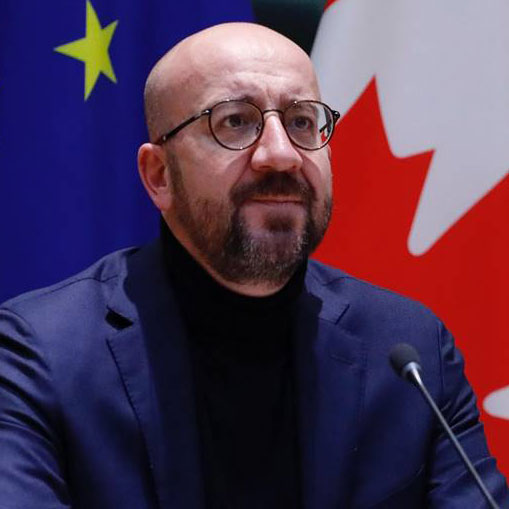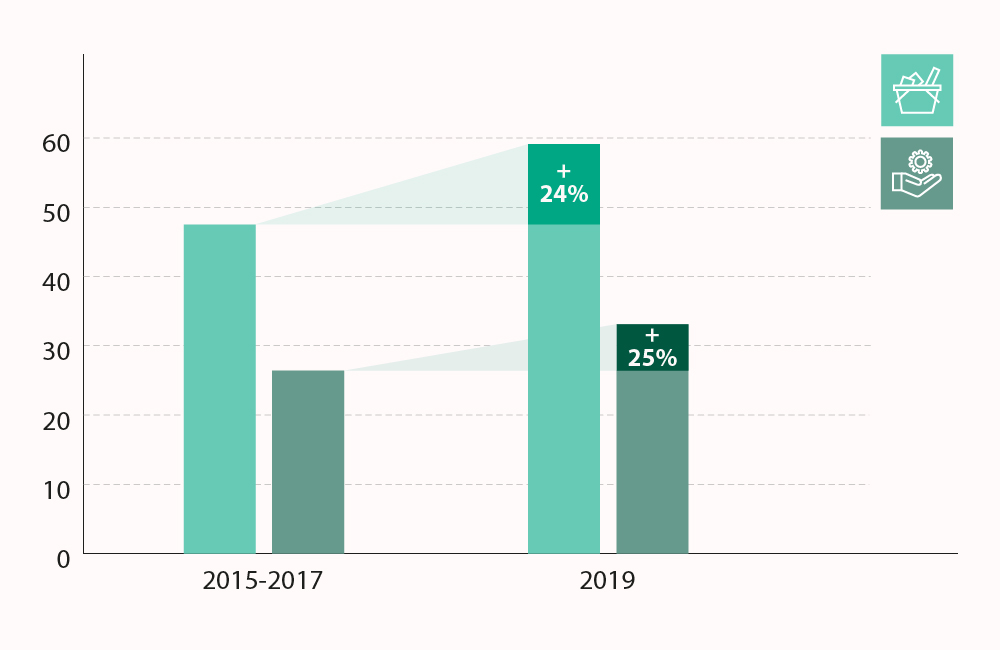Main results
Charles Michel, President of the European Council, and Ursula von der Leyen, President of the European Commission, held a meeting via video conference on 29 October 2020 with Justin Trudeau, Prime Minister of Canada. This was the first joint meeting involving the new EU leadership and PM Trudeau since his re-election and the bilateral summit held in July 2019.

“The EU and Canada are cooperating on COVID vaccines, treatments, and tests – to make sure all people have fair and affordable access”
Charles Michel, President of the European Council
At a joint press conference following their virtual meeting, the three leaders expressed their solidarity with France in view of the terrorist attacks earlier in the day.
The three leaders also issued a joint press release on the EU-Canada leaders’ meeting.
COVID-19 and economic recovery
Leaders highlighted their determination to fight the COVID-19 pandemic together, in line with the shared values of democracy, human rights and the rule of law.
They underlined the twofold goal of protecting citizens’ health and ensuring an innovative, sustainable and inclusive economic recovery.
They emphasised the need to achieve this goal through solidarity, cooperation and multilateralism, and recognised the crucial role of the G7, the G20 and the United Nations in this regard. They committed to continuing their close cooperation in these fora.
Leaders highlighted EU-Canada cooperation on COVID-19 vaccines, treatments and tests. They expressed the common aim of ensuring that all people have fair and affordable access to them. They also discussed ways to strengthen global pandemic preparedness and responses, and to strengthen and reform WHO.
Leaders also stressed the need to make global supply chains more resilient and improve the global level playing field while maintaining open economies. They agreed to deepen work towards a strategic partnership on critical raw materials to support the green and digital transition.
Leaders welcomed G20 efforts to support the most affected low-income countries, especially in Africa, such as the extension of the G20/Paris Club Debt Service Suspension Initiative. They recognised that further debt treatment will be required on a case-by-case basis and called on G20 members to endorse the “Common Framework for Debt Treatment beyond the DSSI” agreed on by the Paris Club.
EU-Canada relations
Infographic – Comprehensive Economic and Trade Agreement (CETA) fuels EU-Canada trade growth
Leaders celebrated the third anniversary of the provisional entry into force of the EU-Canada Strategic Partnership Agreement (SPA) and the Comprehensive Economic and Trade Agreement (CETA). They welcomed CETA’s positive results, noting that bilateral trade between the EU and Canada increased by 24% for goods and 25% for services following its provisional application.
Leaders agreed to continue working together, in the Ottawa Group and beyond, to reform the World Trade Organization (WTO) in order to protect and strengthen the multilateral rules-based trading system at a time of unprecedented crisis, and enable it to deal effectively with new global economic realities, including those related to the COVID-19 pandemic.
Leaders also reaffirmed their commitment to reach a global and consensus-based solution on a fair, sustainable, and modern international tax system that addresses the tax challenges arising from the digitalisation of the economy. They urged G20 Finance Ministers to reach an agreement on the remaining issues by mid-2021.
In light of the urgent need to step up global action to tackle climate change, leaders reaffirmed their shared goal of achieving carbon neutrality by 2050, emphasising that the COVID recovery offers a unique opportunity for a “green reset” of the economy. The EU and Canada will demonstrate increased ambition on reducing greenhouse gas emissions when updating national contributions ahead of COP26.
They also highlighted the close EU-Canadian cooperation on digital transformation, and on using artificial intelligence and digital technologies to support the COVID-19 recovery.
International issues
Leaders underlined their strongly convergent views on a range of foreign policy and security issues, including China, Belarus, Nagorno-Karabakh, the Sahel, the Eastern Mediterranean, and Venezuela. They expressed serious concerns about the human rights situation and the arbitrary detention of EU and Canadian citizens in China.
Leaders emphasised the importance of strong transatlantic relations and the need to uphold the international rules-based system. They also agreed to cooperate on protecting the EU and Canadian democratic systems against cyberattacks and disinformation.
Follow-up
Leaders agreed to hold the next EU-Canada summit when conditions allow, to further advance cooperation between the EU and Canada.
Background
The last bilateral summit between the European Union and Canada took place on 17 and 18 July 2019 in Montreal, Canada.
